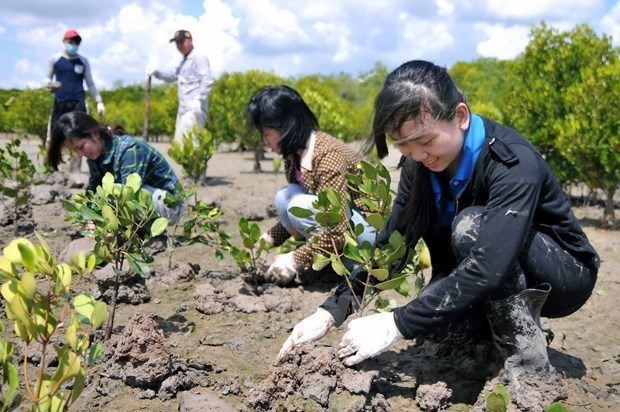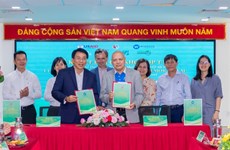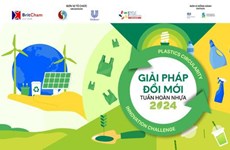Role of community on natural resource management needs to be increased
Vietnam's existing legal system on land, forestry, fishery and biodiversity resources provides great opportunities to further enhance the empowerment of local communities through the models of co-management of natural resources.
 Young people grow trees at Can Gio Protective Forest in HCM City. (Photo: VNA)
Young people grow trees at Can Gio Protective Forest in HCM City. (Photo: VNA)Such models help address the impacts of climate change and the need for more sustainable use of natural resources.
This reflection was highlighted at the High-Level Policy Dialogue: Sustainable Co-Management of Natural Resources in the context of Climate Change, co-hosted by the Ministry of Agriculture and Rural Development (MARD) and the UN Development Programme (UNDP) on August 26.
The dialogue focused on emerging opportunities, effective governance of natural resources, and robust regulation and finance as well as key barriers for scaling up and recommendations to enhance the implementation of nature-based solutions.
Innovative ideas, good practices, knowledge and experiences from both national and international projects that advance the effective collaborative ‘co-management’ of natural resources in a more sustainable and climate-resilient way were shared.
Participation of all the stakeholders in sustainable management and utilisation of natural resources, including water and below-water resources, marine and forest, is essential for achieving the key objectives of the Strategy for Sustainable Agriculture and Rural Development for the 2021-30 period, with a vision to 2050.
Examples include developing green, environmentally friendly agriculture, adapting to climate change, reducing rural environmental pollution, and striving to reduce greenhouse gas emissions by 10 per cent compared to 2020.
Addressing the dialogue, Minister of Agriculture and Rural Development Le Minh Hoan said: “Depleted natural resources, climate change, market fluctuations and changed consumer trends force the agriculture sector to change the mindset, conduct re-organisation as well as re-planning to meet the demands for development.
"The most important point in the current orientations for development is to help people access to knowledge and make better decisions based on available data in management and utilisation of their limited resources.
“The sustainable development of natural resources must be based on three factors namely economic, environmental and social ones. The 'top-down' approach with tough administrative regulations has revealed certain problems in economic, environmental and social aspects."
He said that natural resources still have the tendency to degrade, while local communities – whose livelihood depends on local natural resources – have limited access to and use of these resources.
It is, therefore, necessary to consider other implementation solutions such as "co-management", and "community-based management" to emphasise the important role of the community in monitoring, managing, and sharing natural resource values.
"Collaborative management mechanism has proven significant effectiveness and solidarity of stakeholders through sharing of rights, power, responsibilities and benefits of co-management of natural resources,” Hoan said.
“Law on Fisheries 18/2017 and the Decree 26/2018 stimulate co-management of fishery resources in order to share the right and responsibility in protection and exploitation. In the forest sector, communities widely participate in community-based forest management, in different forms of collaborative management, that have greatly contributed to protecting and developing sustainable forests in Vietnam.”
There is still however space for institutions and policies to further grow the practical and legal space for a more effective and expanded community involvement in co-management.
Many potential areas of sustainable management of natural resources are remote locations with a high rate of ethnic minorities people and lower income social groups and with limited rights to land and natural resource use.
UNDP Resident Representative in Vietnam Caitlin Wiesen said that Vietnam had taken steps towards collaborative management of resources by introducing the relevant legal framework and promoting models at localities. For example, fishery, forestry, and environmental legislations have recognised the roles and processes that enabled local communities to participate in the protection and conservation of natural resources.
Following the adoption of the fishery law and Payment for Forest Environmental Services (PFES), scheme, local authorities and communities have piloted many good models of co-management of marine resources and community-based forest management. For example, local communities in Binh Thuan, Binh Dinh, Thua Thien-Hue, Phu Yen and many other provinces have been empowered to take the lead in protecting fishery and coral reef resources through conservation and sustainable exploitable practice.
Community-based financial schemes have been set up to facilitate co-management efforts.
“To sustain long-term growth, it is vitally important that Vietnam follow a trajectory that invests in, sustains, and regenerates the natural capital that people, communities, and the economy depend on,” she said.
“This is not an endeavor for government alone and will require the full engagement and support from local communities and the private sector. Further empowering and strengthening the roles of local communities and the private sector in natural resources co-management and benefit sharing and integrating such approaches in development plans and budget processes is essential.
"This in turn lays the foundation for successful models of resource co-management for sustainable agriculture production and livelihoods, biodiversity conservation, and carbon sequestration, to be effectively scaled.”
To enhance the co-management of natural resources in Vietnam, it was necessary to enable environment and policies, ensure sustainable access to finance and community-based financial mechanisms and promote learning exchange between communities, she suggested.
“Access to information and data by communities are key to enhancing the effectiveness of co-management practices, including monitoring and tracking the quantity and quality of resources. A database with regular updates of key information on resources, including soil, water, and species in the co-management areas needs to be in place,” she added./.













